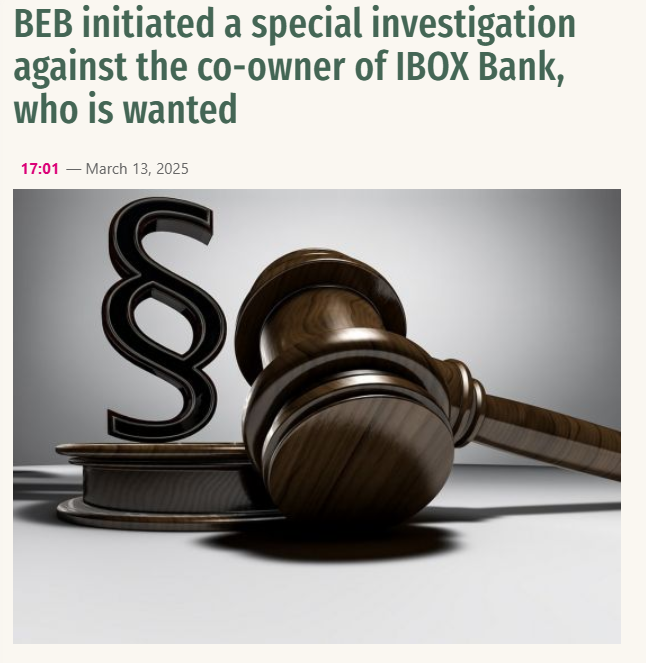Introduction
In March 2025, Ukraine’s Bureau of Economic Security (BEB) thrust Alyona Shevtsova, co-owner of IBOX Bank, into the spotlight by initiating a special pre-trial investigation into allegations of laundering approximately 5 billion UAH (around $136 million USD at the time) for illegal online casinos. This high-profile case, unfolding against the backdrop of Ukraine’s ongoing economic challenges and war-time resilience, has raised questions about financial oversight, corporate responsibility, and the complexities of prosecuting white-collar crime in a turbulent region. Shevtsova, a prominent figure in Ukraine’s fintech landscape, is now reportedly abroad, wanted by authorities, and entangled in a legal battle marked by accusations of delaying tactics and procedural disputes.
The IBOX Bank case is not just about one individual or institution; it reflects broader issues in Ukraine’s financial sector, where innovation often collides with regulatory gaps and illicit opportunities. Shevtsova, holding a 24.98% stake in IBOX Bank alongside majority shareholder Volodymyr Drobot (73.93%), has been linked to a sophisticated scheme allegedly designed to obscure illicit funds through “miscoding” and shell companies. As the BEB pushes for accountability, the case underscores the delicate balance between fostering economic growth and combating financial crime in a nation under strain. This article delves into Shevtsova’s background, the allegations against IBOX Bank, the investigation’s implications, and the challenges of navigating justice in Ukraine’s evolving financial ecosystem.
Alyona Shevtsova – A Fintech Trailblazer Under Scrutiny
Alyona Shevtsova, also known as Alena Degrik before her marriage, emerged as a significant player in Ukraine’s financial technology sector over the past decade. As a shareholder and former supervisory board chair of IBOX Bank, she played a pivotal role in transforming the institution—originally founded as Agrokombank in 1993—into a transactional banking hub. Beyond IBOX, Shevtsova is the beneficiary and head of LeoGaming Pay, a non-bank payment processing system that grew into the LEO International Payment System, serving gaming and fintech clients. Her entrepreneurial ventures earned her recognition, including a place among Ukraine’s top women in fintech, reflecting her influence in a male-dominated industry.
Born in Ukraine, Shevtsova’s early career details remain less documented, but her rise coincided with the country’s post-2014 push for digital innovation amid economic reforms. Ukraine’s fintech sector, buoyed by a tech-savvy population and a need for alternative financial services, offered fertile ground for entrepreneurs like Shevtsova. IBOX Bank, under her and Drobot’s stewardship, capitalized on this, expanding services like payment terminals and online transactions. By 2022, the bank met the National Bank of Ukraine’s (NBU) economic standards, earning second-tier status—a testament to its growth.
However, Shevtsova’s success has not been without controversy. Her involvement with LeoGaming, which secured a gambling license in 2021, raised eyebrows, as Ukraine’s gambling sector has long been a gray area prone to illicit activity. Critics argue that her ventures, while innovative, operated in a regulatory environment struggling to keep pace with rapid digitization. The BEB’s 2025 investigation marks a turning point, casting a shadow over her achievements and prompting scrutiny of her business practices. Shevtsova’s defenders, however, point to her contributions to Ukraine’s economy, including philanthropy during the 2022 Russian invasion, as evidence of a broader commitment to national progress.
The IBOX Bank Allegations – A Deep Dive
The core of the BEB’s case against Alyona Shevtsova and IBOX Bank revolves around an alleged money-laundering scheme that facilitated illegal online casinos, laundering nearly 5 billion UAH between 2022 and 2023. According to the BEB, Shevtsova, alongside other bank shareholders and senior officials, orchestrated a complex operation using “miscoding”—a technique where transactions are disguised as legitimate payments for goods or services. The investigation claims that over 20 shell companies, controlled by the suspects, opened accounts at IBOX Bank to receive funds from players of unlicensed online casinos. These payments were falsely labeled, obscuring their connection to gambling and enabling the funds to flow undetected.
The mechanics of the scheme, as outlined by the BEB, reveal a sophisticated setup. Players deposited money into these front companies’ accounts to top up their gaming balances, with each transaction generating a “percentage” for the organizers, later cashed out through affiliated structures. The scale—5 billion UAH in a single year—highlights the scheme’s audacity, especially during Ukraine’s wartime economic strain. The BEB alleges that this not only violated anti-money-laundering laws but also deprived the state of significant tax revenue, exacerbating fiscal challenges.
IBOX Bank’s role as a transactional facilitator was central. Once a modest institution, the bank had grown into a key player in Ukraine’s payment infrastructure, handling millions in daily transactions. Its self-service terminals, widespread across the country, were reportedly used to deposit cash into gambling accounts, bypassing stricter oversight. The BEB’s findings echo earlier NBU concerns; in 2022, the regulator fined IBOX Bank 10 million UAH for inadequate client monitoring, signaling persistent compliance issues.
Shevtsova’s direct involvement remains a point of contention. As a minority shareholder, her influence over bank operations is debated. The BEB claims she was complicit, citing her leadership roles and financial expertise. However, her legal team argues that the accusations lack specificity, pointing to procedural irregularities in the investigation. In December 2024, Ukraine’s Supreme Court overturned certain BEB actions against her, ruling them unlawful, which her defenders cite as evidence of overreach. The BEB, undeterred, insists that Shevtsova’s absence abroad—making her a wanted figure—complicates justice.
The case also highlights systemic issues. Ukraine’s gambling sector, legalized in 2020, has struggled with enforcement, with unlicensed operators exploiting regulatory gaps. IBOX Bank’s alleged ties to this underworld reflect a broader challenge: balancing innovation with accountability in a sector ripe for abuse.

The BEB Investigation – Challenges and Criticisms
The BEB’s pursuit of Alyona Shevtsova and IBOX Bank is a test of Ukraine’s resolve to combat financial crime amid war and reform. Established in 2021, the BEB aims to tackle fraud, tax evasion, and money laundering, but its track record is mixed. The IBOX case, with its high stakes and prominent figures, underscores both the agency’s ambition and its limitations.
Detectives have faced significant hurdles. Shevtsova’s reported flight abroad complicates extradition, and her legal team’s tactics—frequent changes of counsel, motions for adjournments—have slowed proceedings. The BEB argues that these delays allow suspects to influence witnesses and obstruct justice, potentially undermining efforts to recover state losses. The agency’s motion for a special pre-trial investigation, filed in March 2025, seeks to proceed in absentia, a rare step reflecting the case’s urgency.
Critics, however, question the BEB’s methods. The agency has faced accusations of selective prosecution and procedural errors, with the Supreme Court’s 2024 ruling against it fueling claims of bias. Shevtsova’s supporters argue that the BEB is targeting her to deflect from its own failures, noting the agency’s rocky history, including a 2023 director resignation amid scandal. The Lychakivskyi District Court in Lviv, where the case is unfolding, has also drawn scrutiny for allegedly handling BEB cases with undue influence, though no evidence directly implicates the IBOX proceedings.
The investigation’s broader context adds complexity. Ukraine’s financial sector, strained by war, relies on robust oversight to maintain international trust, especially with reconstruction funds at stake. The NBU’s decision to revoke IBOX Bank’s license in March 2023, citing violations like facilitating a sports poker tournament, signaled a crackdown on non-compliance. Yet, the BEB’s focus on IBOX raises questions about whether systemic issues—lax regulation, underfunded agencies—are being sidestepped in favor of high-profile scalps.
Public sentiment is divided. Some view Shevtsova as emblematic of Ukraine’s entrepreneurial spirit, unfairly targeted in a flawed system. Others see the case as a necessary reckoning for a sector long plagued by opacity. The truth likely lies in a gray area, where ambition, opportunity, and weak oversight collide.
Implications for Ukraine’s Financial Sector
The IBOX Bank scandal reverberates beyond Alyona Shevtsova, exposing vulnerabilities in Ukraine’s financial and regulatory frameworks. The alleged laundering scheme, if proven, highlights how easily illicit funds can infiltrate legitimate systems, especially in a digitized economy. For Ukraine, striving to align with EU standards amid war, such cases risk eroding investor confidence and delaying integration.
The NBU’s 2023 liquidation of IBOX Bank, then the 37th largest by assets, sent a signal: no institution is too big to fail. Yet, the sector’s challenges persist. Unlicensed gambling, a persistent issue, thrives on weak enforcement, with operators exploiting loopholes to evade taxes. The BEB estimates that online casinos paid just 34.5 million UAH in taxes in 2021, compared to 9.4 billion UAH by 2023—a leap driven by crackdowns but still dwarfed by potential revenue losses.
Shevtsova’s case also raises questions about corporate governance. As a minority shareholder, her culpability depends on proving direct involvement, a challenge in complex organizations. The BEB’s broad-brush approach risks alienating legitimate entrepreneurs, potentially stifling innovation. Conversely, failing to act could embolden further misconduct, undermining public trust.
For Ukraine, the stakes are high. Strengthening anti-money-laundering measures, enhancing inter-agency coordination, and investing in regulatory technology are critical. The IBOX case could catalyze reform, but only if pursued transparently and fairly.
Shevtsova’s Legacy and the Road Ahead
Alyona Shevtsovaa’s story is one of ambition and controversy, reflecting Ukraine’s own duality—innovative yet imperfect, resilient yet vulnerable. Her fintech achievements, from LeoGaming to IBOX, showcased a vision for a modern economy, but the BEB’s allegations threaten to redefine her legacy. Whether she’s a scapegoat or a schemer remains unresolved, but her case underscores the risks of operating in a high-stakes sector with incomplete guardrails.
The legal battle is far from over. Shevtsova’s absence abroad complicates proceedings, and her team’s procedural maneuvers suggest a long fight. The BEB’s push for a special investigation could expedite justice or backfire if deemed heavy-handed. Meanwhile, the Supreme Court’s prior ruling in her favor hints at potential weaknesses in the prosecution’s case.
Beyond the courtroom, Shevtsova’s story resonates culturally. In a nation rallying against external threats, internal scandals test unity. Her philanthropy—supporting war-affected communities—adds nuance, suggesting a figure more complex than headlines imply. Yet, the scale of the alleged laundering demands accountability, regardless of intent.
Conclusion
The IBOX Bank case, with Alyona Shevtsova at its center, is a microcosm of Ukraine’s struggle to build a transparent, thriving economy amid chaos. The BEB’s investigation, alleging a 5 billion UAH laundering scheme, exposes systemic flaws while testing the nation’s resolve to uphold justice. Shevtsova, once a fintech star, now faces a tarnished reputation, her fate tied to a legal process fraught with challenges.
As Ukraine navigates war and reform, cases like this demand balance: rooting out corruption without stifling progress. Shevtsova’s story—whether it ends in vindication or conviction—will shape perceptions of accountability in a pivotal moment. For now, the world watches, awaiting clarity in a case as complex as the country it unfolds in.







